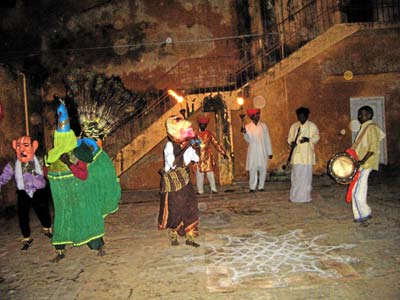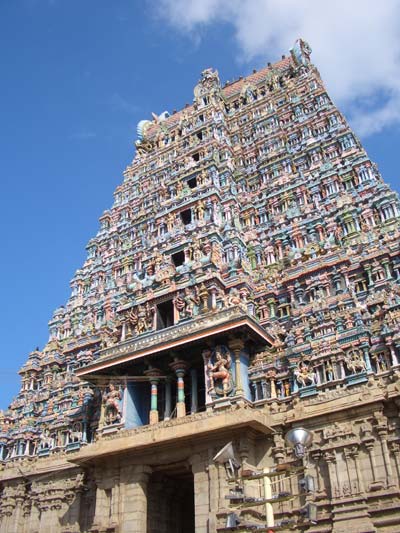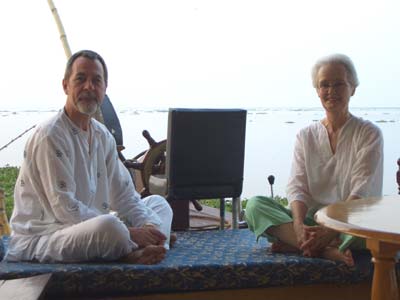Gleanings on the Web™VIGNETTES FROM OUR TRIP TO INDIA 2006 ~ Part II
When we arrived at the town where the ashram for Ramana Maharshi was, we knew we were entering sacred space. Actually, everything is sacred, if we but knew it, but when you enter a space where great reverence has been felt for a long time by many people, the energy is different, and we could feel it. Both the Shiva Temple (Arunchaleswara Temple), and the ashram itself, which was at the foot of Aranachala Hill, left an imprint on us we will not soon forget.
I had the opportunity to visit the bookstore in the ashram, where I bought a copy of Maharshi's beautiful book, Heart Is Thy Name, Oh Lord. In it, he says, "Silence is ever speaking. Silence is unceasing eloquence. It is the best language. All that is required to realize the Self is to be still. What could be easier than that?"
It is said that when Ramana Maharshi was meditating, his presence was both powerful and eloquent. People would come just to sit and be with him Even when he wasn't meditating, he rarely spoke. His deep silence spoke for him. If you had a question, he would know it, and you would intuit the answer. As with all great masters, words are seldom needed. Of course, occasionally there would be those who would ask him questions, and he would graciously respond. When asked about this, he answered, "I speak to them because they cannot yet hear."
I know some of you have done this before, but whether you have or not, just stop for a moment and listen to the silence. Right now. No thought. No activity. Just be still and listen. If you are really listening, you will probably become aware of the listener. That listener is you. It is the eternal presence, and it is always there. When you can carry that awareness with you, your awareness of That Which Is deepens, and you begin to experience the silence - the Presence - which Maharshi knew so well. In that silence, words are no longer needed. You just Are, and that is more than enough.
That is my hope for us all.
*******
A point of confusion for many of us has to do with being able to distinguish between the mind and the soul. In the early stages of spiritual growth, we tend to think of ourselves more as a mind and body. The physical body, of course, is easy to be aware of. The mind is more elusive to grasp, yet it is the mind that moves the body. The mind acts as an energy link between the soul and the body. Ramana Maharshi, of whom I just spoke, is quoted as saying that the mind is "the knot that ties the soul and body together." It is through the mind and body that the soul expresses itself on this plane. So what, then, is the soul? Some would say it is consciousness, pure awareness. Not only do we live in a field of consciousness, each of us is a unique _expression of that field. This means we have an individual aspect to our nature, and we have a universal aspect as well, but it's all the same field.
If you stopped and listened to the silence as I suggested earlier, you probably experienced that part of yourself which is simply aware. You may have even noticed that that silent awareness has no boundaries. It simply Is. That Is-ness is the universal aspect of yourself. It is your state of pure being, and that is what we gravitate toward during our times of meditation.
We can carry that awareness with us, wherever we go, whatever we're doing, but of course, we must begin by being aware of its continued presence. So you might try just practicing being aware of that presence, that silent aspect of your being. Whenever you aren't thinking, it's there. It's there when you are thinking, too, but your attention isn't on it. Let's just practice bringing our attention to it more and more so we can see experientially how our silent nature is the substratum of all that we are. It is always there, and therein is the source of our peace and our wholeness.
*******
Aurobindo is one of my favorite Indian sages/philosophers, so I was particularly pleased to be able to visit the memorial to him in Pondicherry, as well as Auroville, a community which is dedicated to the principles he taught. The following passage by him continues to stick in my mind:
"To be free from all preference and receive joyfully whatever comes from the Divine Will is not possible at first for any human being. What one should have at first is the constant idea that what the Divine wills is always for the best, even when the mind does not see how it is so, to accept with resignation what one cannot yet accept with gladness, and so to arrive at a calm equality which is not shaken, even when on the surface there may be passing reaction to outward happenings. If that is once firmly founded, the rest can come."
If Aurobindo is right, and I believe he is, then what we have suspected all along must certainly be true, and that is that our "work" always begins within. It is not easy to accept difficulties when they come our way, but we must find a way to do so if we would bring balance - and peace - back into our life.
The silent center we've been talking about is the source of that peace. It is always there. It is our safe harbor, even though storms may be raging all around us. Always, we can return to our center and find what we are seeking. If we do this regularly, finding that center of peace will be easier when the storms do come, so I would encourage you to be faithful in your practice. Find room for it even when there doesn't seem to be time for it. Especially when there isn't time for it. How else can we become established in the peace which chaos cannot touch?
*******
I'd like to close this little bit of reverie by telling a funny story.
One of our great privileges when we were in India was to have dinner with the Prince of Thanapur at his palace in Tanjoor. His royal lineage goes back a very l-o-n-g way, with kings and princes ruling in that area since before Christ. They are good people, always seeking to improve the welfare of the people in their "kingdom," so are highly respected throughout India. In fact, it was one of the Prince's grandsires who ordered that the ancient Nadi Scrolls be copied onto new palm leaves over a thousand years ago. The scrolls were several thousand years old and were deteriorating. Thanks to him, the scrolls with their profound messages are still available to us.
So there we were, in our very best "Indian" outfits, arriving at the palace. We were greeted by musicians and dancers, as well as guards with lighted torches who led us through the courtyard and into the palace.
The palace is huge. It would be easy to get lost in there if you didn't know your way around. We didn't see all of it, but we walked through quite a bit of it, before being escorted into a special room where we were introduced to the prince. After having a nice visit with him, we were then escorted to the dining hall - which was another tour in itself - and seated at tables around the room. It so happened that my friend, Judy, and I were just two tables away from the prince. The waiters, of course, were in full costume, all very regal and royal, and served us many courses as the evening progressed.
About halfway through the meal, I realized I couldn't find the case to my camera. I had it when we were seated, but now I couldn't find it. I started looking all around me, even down by my feet, but no case. Forgetting completely where I was, I did what I would have done at home - I got up and went around to the front of the table, bent over, lifted up the table cloth, and started looking under the table.
Suddenly I was surrounded by waiters of every size and description, and one of them said, "Madam! Is there a problem?"
Retrieving myself from under the table cloth, I stood up and said, "I can't find the case to my camera. I think it must be under there."
With a bow and a gallant sweep of his arm, as though he did this every day, he said, "Please, madam, allow me," and he crawled under the table.
After a moment, he backed out, stood up and brushed himself off a bit, then coming to complete attention, he extended his hand as though presenting a crown and said, "Your case, madam."
A collective sigh of relief was heard around the room as everyone settled back into their chairs and continued with their meal.
I'm told we had everyone's complete attention, and of course, we've been laughing about it ever since.
I hope humor will find a place in your life this week. Perhaps not in such a conspicuous way, but do find things to laugh about. You'll be glad you did.
*******
~Donna Miesbach~
Click here to email this page to a friend. Click here for Gleanings archives.



